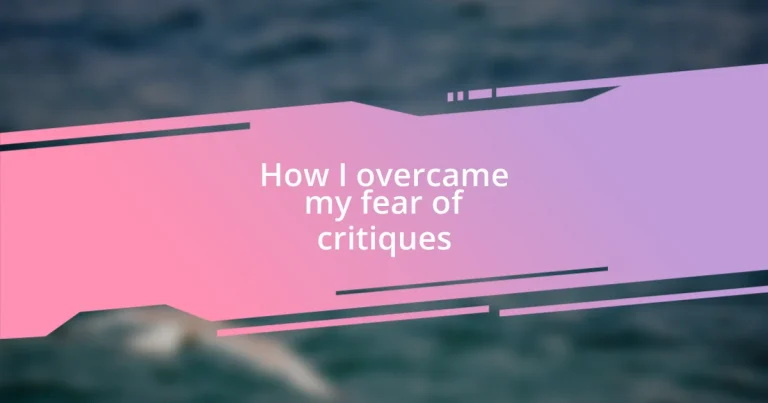Key takeaways:
- Shifting the perception of critiques from personal attacks to opportunities for growth fosters resilience and open-mindedness in receiving feedback.
- Building a supportive network of mentors and peers helps to create a positive environment where constructive criticism is encouraged and appreciated.
- Setting specific goals for feedback and celebrating small wins reinforces motivation and a growth mindset, transforming the experience of receiving critiques into a rewarding journey.
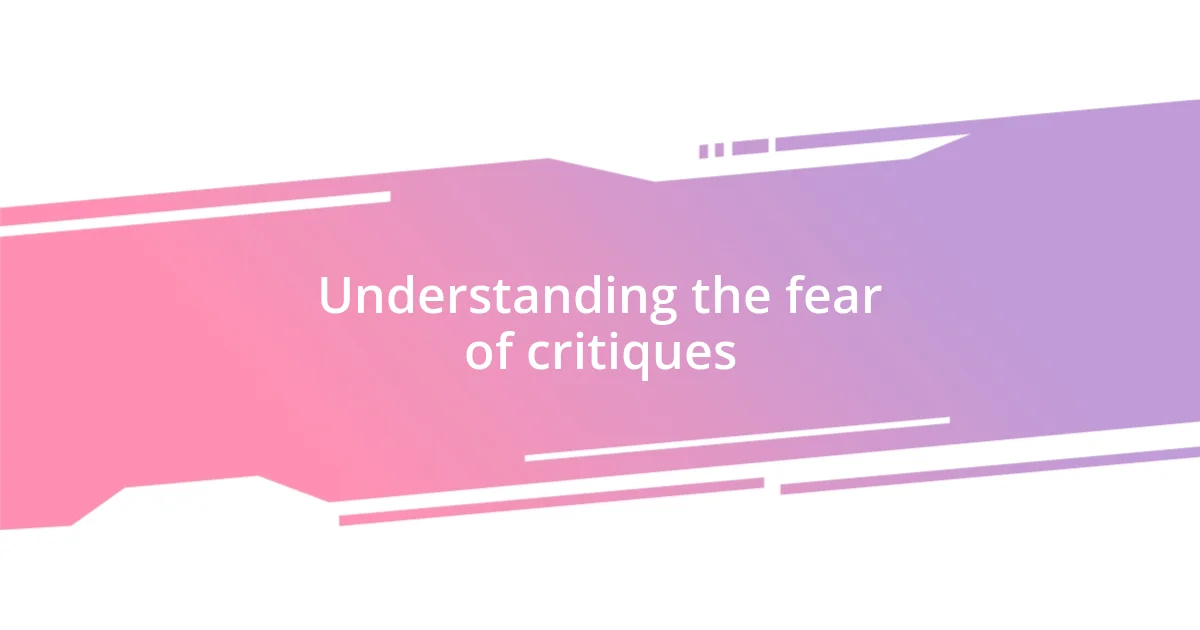
Understanding the fear of critiques
Fear of critiques often stems from a deeply ingrained desire for approval. I remember the first time I shared my work with others; my heart raced at the thought of their judgments. Have you ever felt your stomach drop at the prospect of someone pointing out your flaws?
It’s fascinating how our minds can magnify even the slightest chance of criticism, twisting it into something overwhelming. I used to believe that criticism equated to failure, but over time, I realized this mindset only stifled my growth. When I shifted my perspective, I began to see critiques as stepping stones rather than stumbling blocks.
The emotional weight of critiques can be heavy, especially when we internalize them as reflections of our worth. Once, a particularly harsh review left me questioning my abilities for days. But what I learned from that experience was invaluable: critiques, when constructive, help us evolve. How often do we confuse criticism with a personal attack? By shifting this narrative, we can reclaim our power and encourage growth.
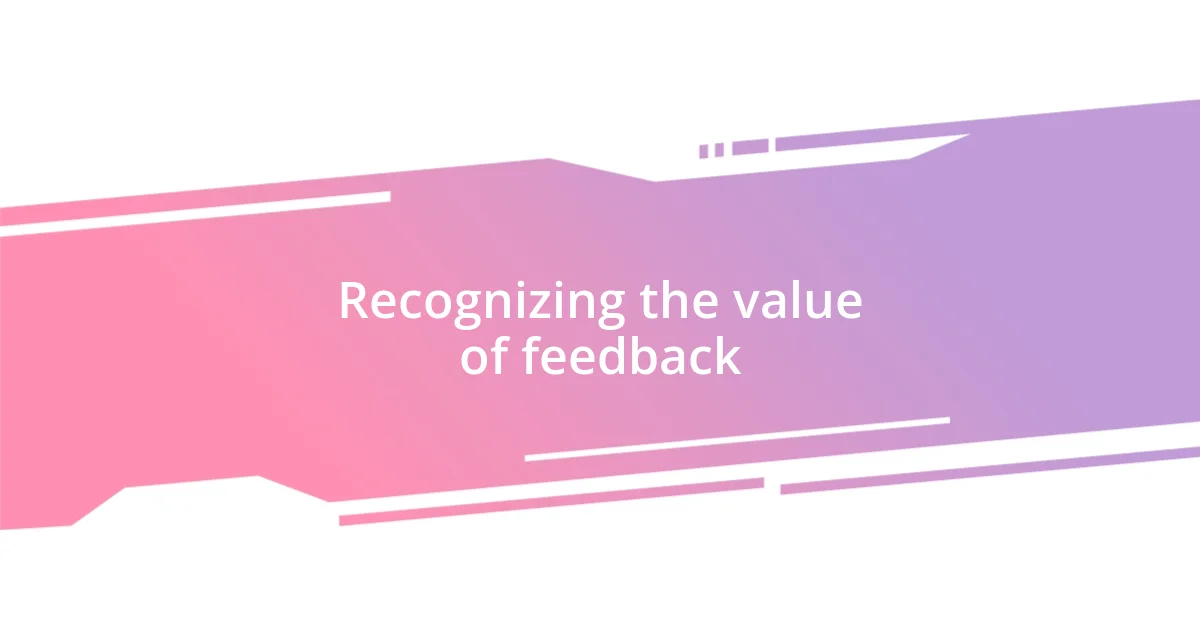
Recognizing the value of feedback
Recognizing the value of feedback is a game changer. I’ve come to truly appreciate that feedback is not just about what I did wrong but about how I can do better. There was a time when I received a review that felt more like a punch to the gut than a guiding hand. Yet, after stepping back and analyzing it, I discovered it pinpointed my weaknesses, allowing me to refine my craft.
- Feedback provides fresh perspectives that I might overlook.
- Constructive criticism can ignite creativity and new ideas.
- It fosters improvement and encourages personal growth.
- Understanding feedback helps build resilience against fear of judgment.
Training myself to seek out and welcome feedback transformed my approach to my work. By viewing critiques as potential insights, I found myself less defensive and more open, leading to a more enriched learning experience. Remembering that feedback is often intended to help and uplift others can shift your mindset entirely.
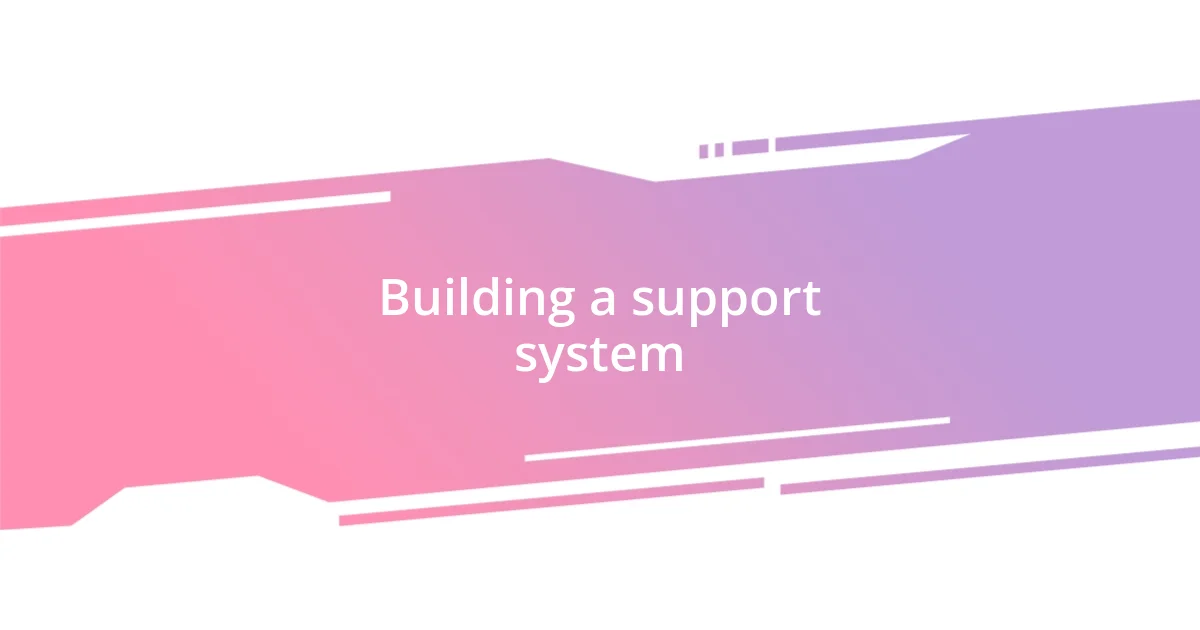
Building a support system
Building a support system is crucial when facing the fear of critiques. I discovered that surrounding myself with individuals who not only understand the value of feedback but also offer positive reinforcement made a world of difference. For instance, sharing my work with friends who would cheer on my efforts, despite any flaws, transformed my perception of critiques. Have you ever found encouragement in unexpected places?
Creating a network of supportive people in my life helped me grow. I made it a point to connect with mentors who had walked the same path, and their insights were invaluable. Once, during a particularly tough project, I reached out to a mentor who shared his own experiences of overcoming harsh critiques. His stories made me realize that even the most accomplished people face criticism. It fosters a sense of community and understanding that we’re all in this together.
Ultimately, I learned that my support system isn’t just about receiving encouragement; it’s also about giving it. By fostering an environment where we critique each other constructively, I’ve not only found strength in vulnerability but also built lasting relationships. This reciprocal process has not only fortified my courage to face critiques but has also made me more resilient.
| Support System Building Blocks | Benefits |
|---|---|
| Encouragement | Boosts confidence and reduces anxiety |
| Mentorship | Gains insights from experienced individuals |
| Reciprocal Feedback | Promotes personal and mutual growth |
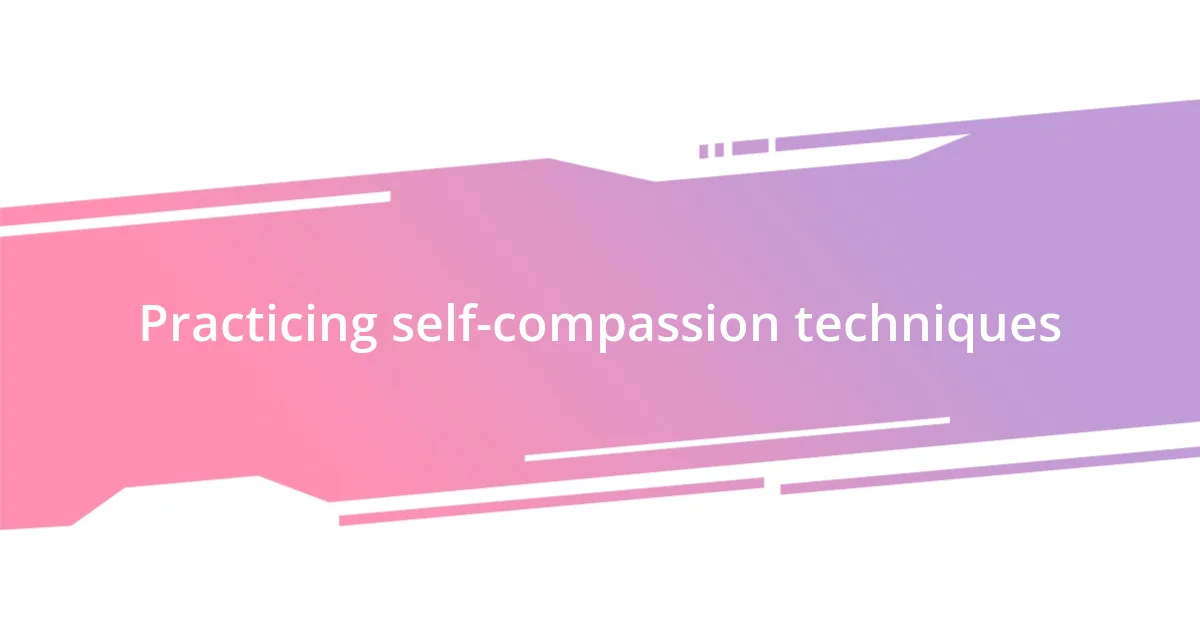
Practicing self-compassion techniques
Practicing self-compassion has been crucial in my journey to overcome the fear of critiques. I remember a specific moment when I received harsh feedback on a project I poured my heart into. Instead of spiraling into self-doubt, I consciously took a step back and reminded myself that everyone makes mistakes and that this experience does not define my worth. How often do we forget that being kind to ourselves can change everything?
One technique I embraced was the practice of self-affirmation. Each time I faced criticism, I would affirm my abilities and remind myself of previous successes. It was like giving my inner critic a gentle nudge to take a seat and allowing my supportive voice to take the spotlight. I would close my eyes, breathe deeply, and say aloud, “I am capable, and this feedback is a stepping stone to growth.” Have you ever tried talking to yourself in a way that a good friend would?
Additionally, journaling became a safe space where I could express my feelings without fear of judgment. After a particularly tough critique, I would write down my initial emotions, acknowledging the pain but also reflecting on what I could learn from the experience. This process often led me to surprising insights, transforming my fear into motivation. I found that writing these experiences down not only helps to release negativity but also cultivates a deeper understanding of my personal journey. What if I told you that your journal could be your best ally in fostering self-compassion?
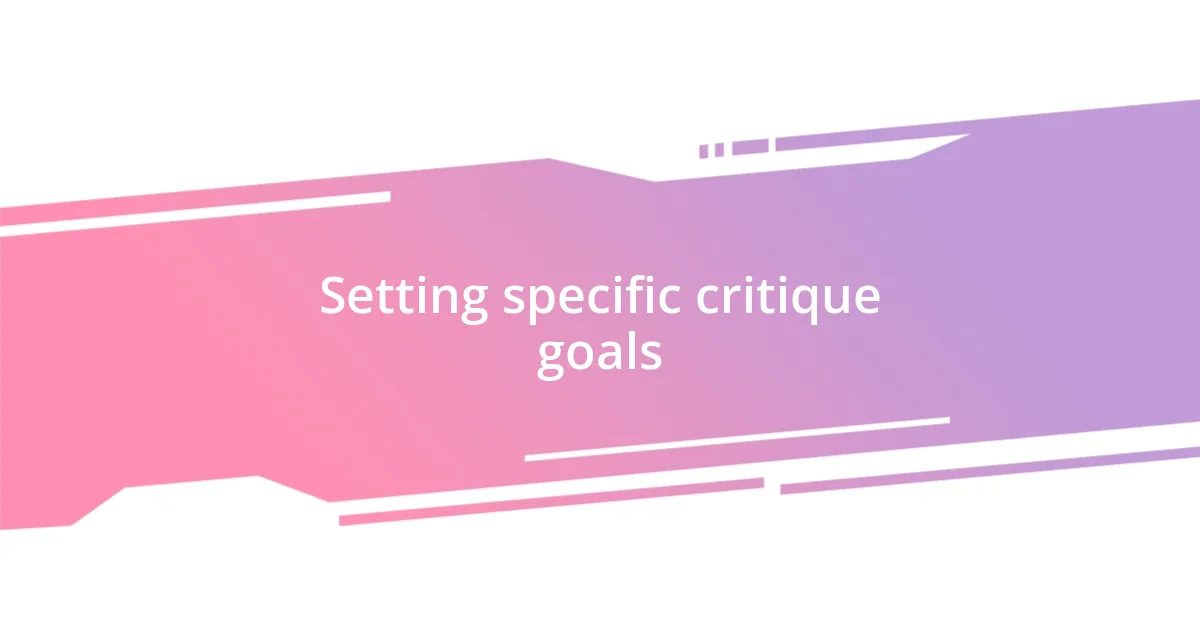
Setting specific critique goals
Setting specific critique goals can dramatically reshape how you engage with feedback. I remember when I decided to take a more structured approach to my critiques. Instead of simply asking for general feedback, I started to pinpoint what I wanted to improve—be it clarity, structure, or engagement. This shift turned feedback sessions into focused discussions, allowing me to really dive deeper and extract actionable insights. Have you ever noticed how clarity can transform a vague critique into a valuable roadmap?
Furthermore, I began to outline specific objectives for each piece of work I shared. For example, I set a goal to receive at least three points regarding my writing style before presenting a draft to my peers. This not only made my expectations clear but also encouraged constructive dialogue. My colleagues seemed more inclined to respond thoughtfully when they understood what I was aiming for. Did you ever think that by being specific, you might actually empower those reviewing your work?
Over time, I also learned to celebrate small victories tied to these goals. After I made adjustments based on feedback, I would take a moment to acknowledge that growth; it helped me stay motivated. Each successful critique felt more like a stepping-stone than a minefield, reinforcing the idea that progress is a journey, not a destination. What if I told you that recognizing these small wins could make facing critiques feel less daunting and much more rewarding?
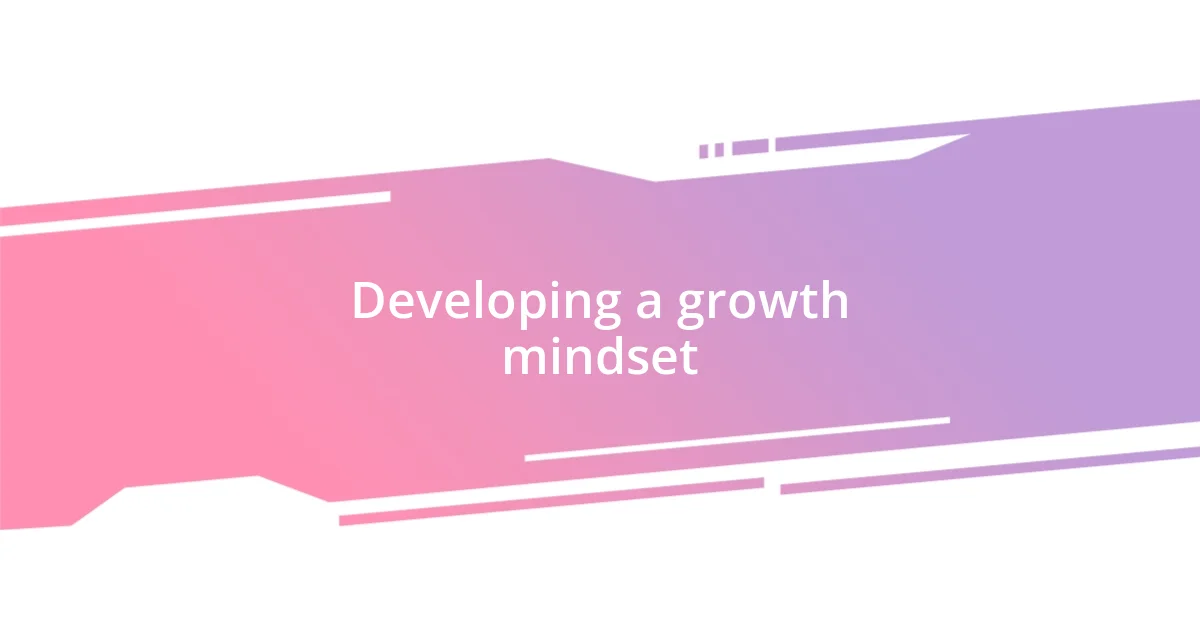
Developing a growth mindset
Developing a growth mindset has profoundly shifted my approach to feedback and critiques. I vividly recall the first time I intentionally reframed a negative comment. Rather than viewing it as a personal attack, I decided to see it as a lens into areas I could grow. It was enlightening! Have you ever had that “aha” moment where a shift in perspective opened up new possibilities for you?
In my experience, cultivating curiosity about feedback became key. Instead of bracing myself defensively, I started to ask questions. For instance, when I received criticism on my presentation skills, I would inquire about specific examples of what worked and what didn’t. This curiosity transformed the anxiety of receiving critiques into eagerness to learn. Isn’t it amazing how curiosity can turn fear into fuel for improvement?
As I embraced this mindset, I found myself thriving outside my comfort zone. I remember volunteering to lead a workshop after receiving constructive feedback on my teaching style. The anxiety that bubbled up initially soon morphed into excitement, knowing I had the chance to apply what I’d learned. And guess what? The experience not only helped me grow but also inspired others around me. How often do you think stepping out of your comfort zone could ignite growth in unexpected ways?
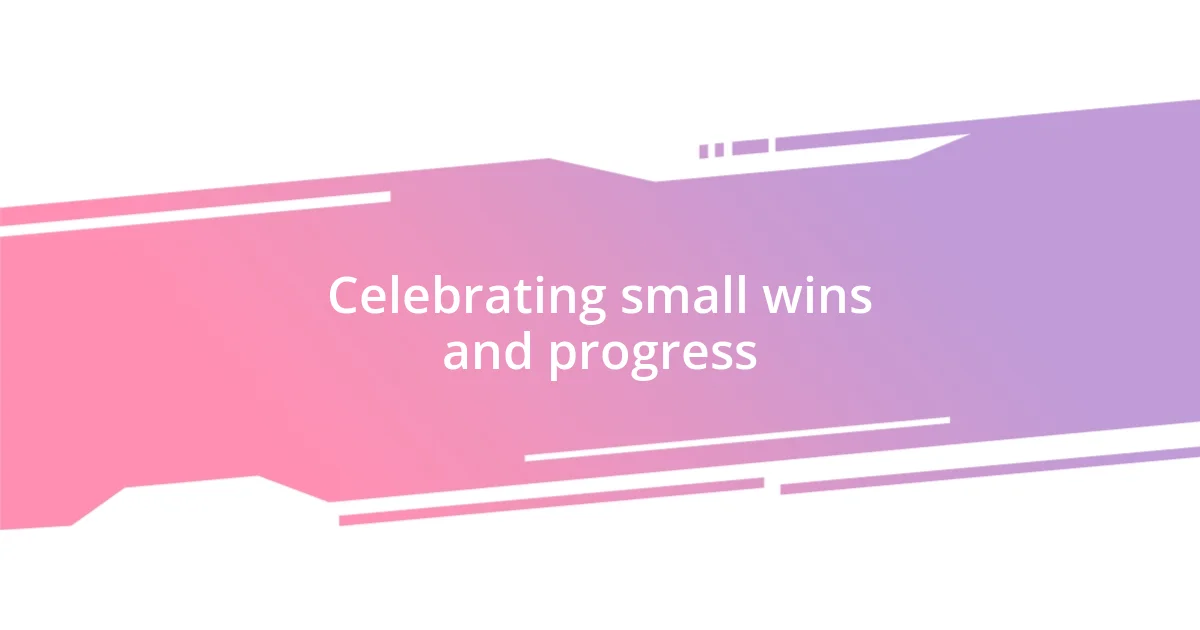
Celebrating small wins and progress
Recognizing small wins along my journey made a world of difference in how I approached critiques. After receiving feedback on my latest article, I made an effort to implement just one suggested change at a time. I can still recall the rush of satisfaction when a colleague praised my improved clarity. It was a game-changer for my confidence and helped me see that progress often comes in small, manageable steps. Isn’t it fascinating how acknowledging these little victories can energize your entire process?
I began setting aside moments after each feedback session to celebrate my growth, no matter how minor it seemed. Once, after a particularly challenging critique, I treated myself to my favorite coffee shop. Each sip reminded me that I was not just surviving feedback, but thriving because of it. This practice turned what could feel like a daunting task into a rewarding experience. Have you thought about what small celebrations could look like for you?
Even on days when I felt overwhelmed, I made it a point to jot down three things I learned from critiques. I still keep that notebook handy. Flipping through its pages offers a tangible reminder of how far I’ve come. It’s amazing how writing down those reflections allowed me to visualize my growth over time. Could it be that celebrating small wins opens the door to a more positive mindset toward feedback?












